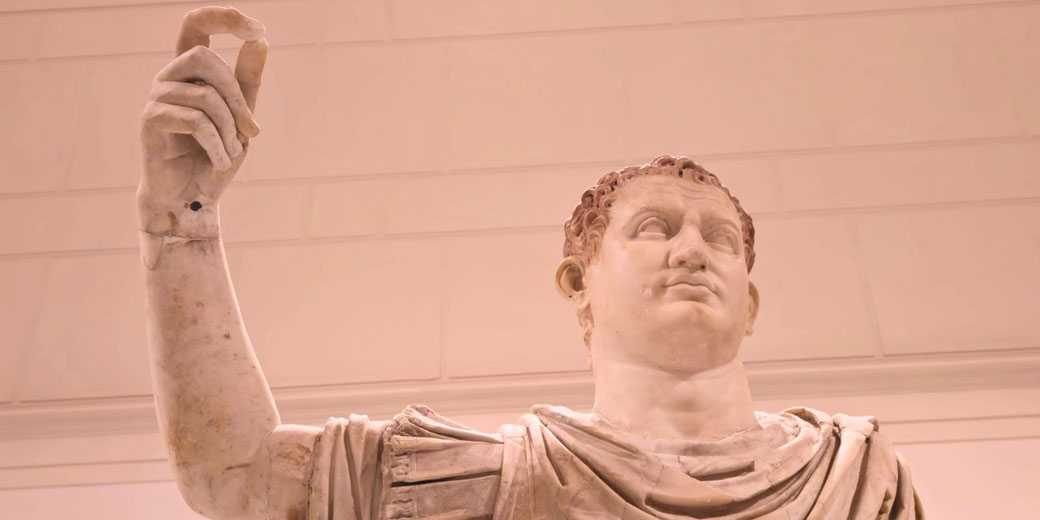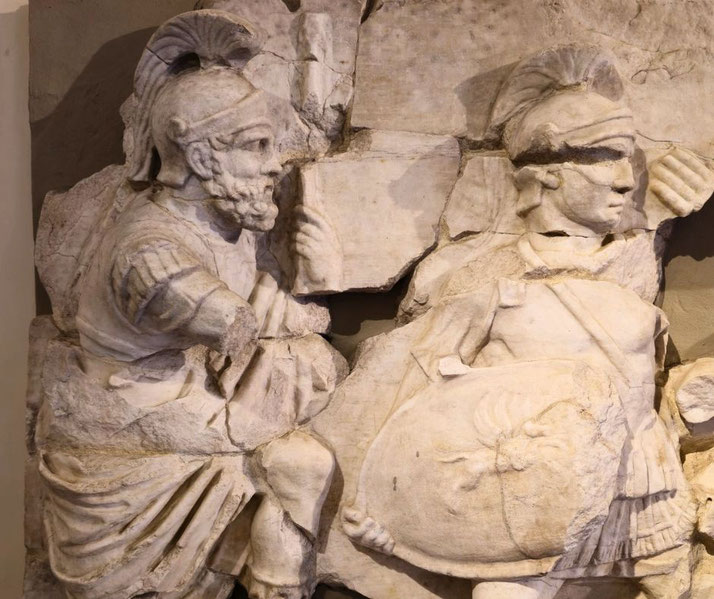The fall of Jerusalem, destruction of Pompeii, and birth of the Colosseum: the life of Emperor Titus

Titus was the Roman emperor from AD 79 to 81. He was the son of the previous emperor, Vespasian, who was the founder of the Flavian dynasty, and succeeded his father as emperor after his death.
Titus is best known for his military campaigns in Judaea and his capture of the city of Jerusalem in AD 70.
He also made important contributions to Roman culture, inaugurating the Flavian Amphitheater (better known as the Colosseum) and sponsoring public works projects throughout Rome.
The rise of Titus' family
Titus was born in Rome in December of AD 39, the son of Vespasian and his wife Domitilla.
Titus was the eldest of two brothers. His younger brother, called Domitian, would also become emperor later in life.
Titus' father, Vespasian, was not from the previous imperial family, known as the Julio-Claudian dynasty.
However, he had risen to military prominence during the reign of Emperor Claudius (AD 41-54) when he served in the invasion of Britain.
His success resulted in Vespasian becoming consul in AD 51, when Titus was 12 years old.
As Vespasian's power and prominence increased, it meant that Titus benefitted from a court education and was taught at a young age by some of the best tutors in Rome.
Titus also became connected with members of the imperial family. In particular, he became friends with emperor Claudius' son, called Britannicus.
However, when Claudius died and was replaced by Nero, Britannicus fell out of favour, because he was seen as a rival for the throne.
When attending a party with Britannicus one night in AD 55, the 16-year-old Titus watched his friend die by poisoning, which was rumoured to have been ordered by Nero himself.
Titus' early military career
At the age of 16, Titus was old enough to begin a career in politics. In around AD 58, he became a military tribune in Germania and also served as a minor commander in Britannia just after the Boudiccan Revolt in AD 60.
In around AD 63, Titus returned to Rome and married Marcia Furnilla. However, despite the match seeming to be one based upon mutual affection, Titus was forced to divorce by Nero himself, probably for political reasons.
Titus would never remarry, but his long-standing relationship with Berenice, the sister of Herod Agrippa II, was politically contentious.
Also, around this time, Titus practiced law and was elected as a quaestor.

Titus and the Jewish War
In AD 66, Titus' life was about to change dramatically. This was due to an armed revolt in the eastern provinces of the Roman Empire.
In AD 66, the Jews of the province of Judaea revolted against the Roman Empire.
The emperor Nero sent Titus' father, Vespasian, as the overall commander to defeat the Jewish rebels.
He was given three legions and a large auxiliary force to achieve this. Titus joined his father as a sub-commander.
By AD 68, the Roman army had captured the north of Judaea, during which time, Titus had distinguished himself as a gifted military leader.
However, events back in Rome in AD 68, meant that the Judaean campaign had to be temporarily halted.
Vespasian had received word that Nero had committed suicide and that two separate Roman generals had begun marching on Rome to seize power.
This period of time was known as the 'Year of the Four Emperors'. Vespasian initially declared loyalty to the first general to reach Rome in AD 69, called Galba, and sent Titus to Rome to arrange his affairs.
However, when Titus arrived, he learnt that Galba himself had been defeated by another general, Otho.
He also learnt that another challenger, called Vitellius was also marching towards the city.
Returning to his father in the east, Titus updated him on the latest developments.
At this point, Vespasian declared himself a challenger for the throne and, leaving Titus in charge of the forces in Judaea, marched his own army back towards Italy.
When Vespasian arrived in Rome, he defeated the last successful claimant to the throne, Vitellius, and finally, Vespasian emerged as new emperor in December of AD 69.
Following this, Titus took control of the four Roman legions (V Macedonica, XII Fulminata, XV Apollinaris, and X Fretensis) in Judaea and continued the military campaign through the years AD 70 to 71.
In AD 70, Titus captured and destroyed the city of Jerusalem after a two-year siege.
He was awarded a triumph for his victory over the Jews and celebrated with a triumph when he returned to Rome in AD 71.
Then, when Vespasian died in AD 79, Titus succeeded him as emperor.
Titus as the imperial heir
Back in Rome, and with his father as emperor, Titus' political career now advanced quickly.
Both Titus and his brother Domitian were given the title of 'Caesar' and awarded tribunician powers. Titus also held seven consulships during Vespasian's time in power.
Titus was also appointed as the Praetorian prefect, which meant that he was in command of the praetorian guard, the emperor's personal bodyguard.
He seemed to have taken the job of protecting his father very seriously and ancient historians record that Titus was willing to execute any person who posed a threat to the emperor.
In AD 79, a plot to kill Vespasian was uncovered and the ringleaders, Aulus Caecina Alienus and Eprius Marcellus, were executed under Titus' orders.
Then, when Vespasian died in AD 79, Titus succeeded him as emperor.
Was Titus a good emperor?
At the start of his reign as emperor, Titus made it clear that he intended to continue his father's policies of strengthening the empire and restoring Roman values.
As a result, he began no new wars, and he developed a reputation for personal generosity to the Roman people.
Titus managed to complete the construction of the Colosseum in AD 80, which had been started by Vespasian.
This massive amphitheater that could hold an estimated 50,000 to 80,000 spectators, and it became one of Rome's most iconic landmarks and a symbol of Roman power.
Titus also put on lavish public games and shows to entertain the people of Rome.
Dealing with crises
The most famous event that occurred during Titus' time as emperor was the eruption of Mount Vesuvius in AD 79, just a few months after he took the throne.
The eruption caused significant destruction in the region of Naples and the cities of Pompeii and Herculaneum were buried ash and pumice, resulting in the death of thousands.
The region of Naples was an important agricultural region and this eruption caused economic damage that needed to be fixed.
Titus appointed two former consuls to oversee the relief effort, while the emperor himself spent money from the imperial treasury to support the reconstruction.
The emperor took the additional step of personally visiting the ruins of Pompeii to hear about the plight of the local people.
He also did this a second time in the spring of the following year, AD 80.
However, during this second visit, Titus learned of another disaster occurring back in Rome.
A large fire had broken out in Rome which burnt for three days and three nights before it could be extinguished.
A large area of the city, from the Capitol hill to the Pantheon was destroyed. To make matters worse, a plague then broke out in Rome, in which many people died.
Titus rushed back to the city and, once more, spent significant sums of his own money to help in the clearing and rebuilding of the damaged areas.
The death of Titus
In the summer of AD 81 Titus was travelling with his brother, Domitian, when he suddenly became ill.
It is probable that it was caused by malaria, but many suspected that he had been poisoned by Domitian.
Domitian left Titus while he was still sick and travelled back to Rome where, it was claimed, he declared himself emperor.
Titus died on the 13th of September, AD 81 at the age of 42. He had been emperor for almost two years and three months.
Titus was a popular emperor during his lifetime and was posthumously deified by the Senate.
Titus' legacy is one of military success and public works projects that improved the city of Rome.
He is also remembered for his generosity and concern for the welfare of his people.
He was succeeded by his brother Domitian, who ruled for 15 years. After Domitian's death, the Flavian dynasty would come to an end.

Further reading
What do you need help with?
Download ready-to-use digital learning resources
Copyright © History Skills 2014-2025.
Contact via email
With the exception of links to external sites, some historical sources and extracts from specific publications, all content on this website is copyrighted by History Skills. This content may not be copied, republished or redistributed without written permission from the website creator. Please use the Contact page to obtain relevant permission.





